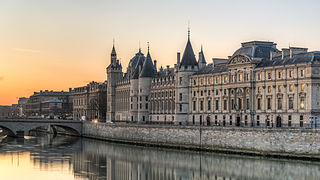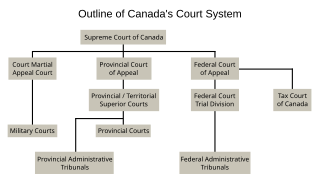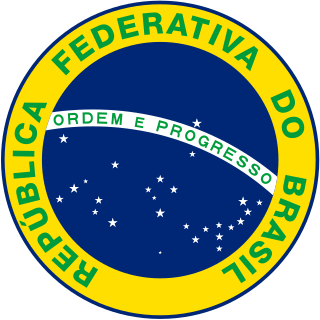
The Permanent Court of Arbitration (PCA) is an intergovernmental organization located at The Hague in the Netherlands. The PCA is not a court in the traditional sense but provides services of arbitral tribunal to resolve disputes that arise out of international agreements between member states, international organizations or private parties. The cases span a range of legal issues involving territorial and maritime boundaries, sovereignty, human rights, international investment, and international and regional trade. The PCA is constituted through two separate multilateral conventions with a combined membership of 121 states. The organization is not a United Nations agency,
but the PCA is an official United Nations Observer.

The politics of Bolivia takes place in a framework of a presidential representative democratic republic, whereby the president is head of state, head of government and head of a diverse multi-party system. Executive power is exercised by the government. Legislative power is vested in both the government and the two chambers of parliament. Both the Judiciary and the electoral branch are independent of the executive and the legislature. After the 2014 election, 53.1% of the seats in national parliament were held by women, a higher proportion of women than that of the population.

The Conciergerie is a building in Paris, France, located on the west of the Île de la Cité, formerly a prison but presently used mostly for law courts. It was part of the former royal palace, the Palais de la Cité, which consisted of the Conciergerie, Palais de Justice and the Sainte-Chapelle. Hundreds of prisoners during the French Revolution were taken from the Conciergerie to be executed by guillotine at a number of locations around Paris.

An unlawful combatant, illegal combatant or unprivileged combatant/belligerent is a person who directly engages in armed conflict in violation of the laws of war or is fighting outside of internationally recognized military forces. An unlawful combatant may be detained or prosecuted under the domestic law of the detaining state for such action, subject to international treaties on justice and human rights.

A kangaroo court is a court that ignores recognized standards of law or justice, and often carries little or no official standing in the territory within which it resides. The term may also apply to a court held by a legitimate judicial authority who intentionally disregards the court's legal or ethical obligations. The defendants in such courts are often denied access to legal representation and in some cases, proper defence.

A tribunal, generally, is any person or institution with authority to judge, adjudicate on, or determine claims or disputes—whether or not it is called a tribunal in its title.
For example, an advocate who appears before a court with a single judge could describe that judge as 'their tribunal'. Many governmental bodies that are titled 'tribunals' are so described to emphasize that they are not courts of normal jurisdiction. For example, the International Criminal Tribunal for Rwanda is a body specially constituted under international law; in Great Britain, employment tribunals are bodies set up to hear specific employment disputes. In many cases, the word tribunal implies a judicial body with a lesser degree of formality than a court, to which the normal rules of evidence and procedure may not apply, and whose presiding officers are frequently neither judges nor magistrates. Private judicial bodies are also often styled 'tribunals'. However, the word tribunal is not conclusive of a body's function–for example, in Great Britain, the Employment Appeal Tribunal is a superior court of record.

The court system of Canada forms the judicial branch of government, formally known as "The Queen on the Bench", which interprets the law and is made up of many courts differing in levels of legal superiority and separated by jurisdiction. Some of the courts are federal in nature, while others are provincial or territorial.

The Scottish Courts and Tribunals Service (SCTS) is an independent public body which is responsible for the administration of the courts and tribunals of Scotland. The Service is led by a board which is chaired by the Lord President of the Court of Session, and employs over 1000 staff members in the country's 39 sheriff courts, 34 justice of the peace courts, the Court of Session and the High Court of Justiciary, and at the service's headquarters in Edinburgh. The day-to-day administration of the service is the responsibility of its Chief Executive and Executive Directors. The Scottish Courts and Tribunals Service is also responsible for providing administrative services for the Judicial Office for Scotland, the Office of the Public Guardian, the Accountant of Court, the Criminal Courts Rules Council, and the Scottish Civil Justice Council.

Elections in Bolivia gives information on elections and election results in Bolivia.

Brazil elects on the national level a head of state—the president—and a legislature. The president is elected to a four-year term by absolute majority vote through a two-round system. The National Congress has two chambers. The Chamber of Deputies has 513 members, elected to a four-year term by proportional representation. The Federal Senate has 81 members, elected to an eight-year term, with elections every four years for alternatively one-third and two-third of the seats. Brazil has a multi-party system, with such numerous parties that often no one party has a chance of gaining power alone, and so they must work with each other to form coalition governments.

The Judiciary of the Hong Kong Special Administrative Region is the judicial branch of the Hong Kong Special Administrative Region. Under the Basic Law of Hong Kong, it exercises the judicial power of the Region and is independent of the executive and legislative branches of the Government. The courts in Hong Kong hear and adjudicate all prosecutions and civil disputes, including all public and private law matters.
The Roman Rota, formally the Apostolic Tribunal of the Roman Rota, and anciently the Apostolic Court of Audience, is the highest appellate tribunal of the Catholic Church, with respect to both Latin-rite members and the Eastern-rite members and is, with respect to judicial trials conducted in the Catholic Church, the highest ecclesiastical court constituted by the Holy See. An appeal may be had to the Pope himself, who is the supreme ecclesiastical judge. The Catholic Church has a complete legal system, which is the oldest in the West still in use. The court is named Rota (wheel) because the judges, called auditors, originally met in a round room to hear cases. The Rota was established in the 13th century.

The Supreme Federal Court is the supreme court of Brazil, serving primarily as the Constitutional Court of the country. It is the highest court of law in Brazil for constitutional issues and its rulings cannot be appealed. On questions involving exclusively non-constitutional issues, regarding federal laws, the highest court is, by rule, the Superior Court of Justice.
Martial Joseph Armand Herman (guillotined), was a politician of the French Revolution, and temporary French Foreign Minister.

The Federal Government of Brazil is the national government of the Federative Republic of Brazil, a republic in South America divided in 26 states and a federal district. The Brazilian federal government is divided in three branches: the executive, which is headed by the President and the cabinet; the legislative, whose powers are vested by the Constitution in the National Congress; and the judiciary, whose powers are vested in the Supreme Federal Court and lower federal courts. The seat of the federal government is located in Brasília. This has led to "Brasília" commonly being used as a metonym for the federal government of Brazil.
The Judiciary of Puerto Rico is defined under the Constitution of Puerto Rico and consists of the Supreme Court of Puerto Rico, Court of Appeals, and the Court of First Instance consisting of the Superior Courts and the Municipal Courts.














